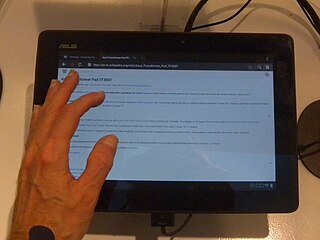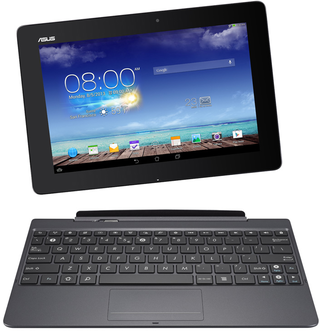Related Research Articles

A netbook is a small and inexpensive laptop designed primarily as a means of accessing the Internet. Netbooks were sold from 2007 until around 2013, when the widespread advent of smartphones and tablets eclipsed their popularity.

A tablet computer, commonly shortened to tablet, is a mobile device, typically with a mobile operating system and touchscreen display processing circuitry, and a rechargeable battery in a single, thin and flat package. Tablets, being computers, have similar capabilities, but lack some input/output (I/O) abilities that others have. Modern tablets largely resemble modern smartphones, the only differences being that tablets are relatively larger than smartphones, with screens 7 inches (18 cm) or larger, measured diagonally, and may not support access to a cellular network. Unlike laptops, tablets usually run mobile operating systems, alongside smartphones.

Asus Eee is a family of products by AsusTek Computer Inc. The product family began with the release of the Eee PC subnotebook in 2007; since then, the product family has diversified into a number of PC form factors. According to the company, the name Eee derives from "the three Es," an abbreviation of its advertising slogan for the device: "Easy to learn, Easy to work, Easy to play".

IdeaPad is a line of consumer-oriented laptop computers designed, developed and marketed by Lenovo. The IdeaPad mainly competes against computers such as Acer's Aspire, Dell's Inspiron and XPS, HP's Pavilion, Envy, Stream, and Spectre, Samsung's Sens and Toshiba's Satellite.
This is a list of tablet computers, grouped by intended audience and form factor.
Rockchip is a Chinese fabless semiconductor company based in Fuzhou, Fujian province. Rockchip has been providing SoC products for tablets & PCs, streaming media TV boxes, AI audio & vision, IoT hardware since founded in 2001. It has offices in Shanghai, Beijing, Shenzhen, Hangzhou and Hong Kong. It designs system on a chip (SoC) products, using the ARM architecture licensed from ARM Holdings for the majority of its projects.
The history of tablet computers and the associated special operating software is an example of pen computing technology, and thus the development of tablets has deep historical roots. The first patent for a system that recognized handwritten characters by analyzing the handwriting motion was granted in 1914. The first publicly demonstrated system using a tablet and handwriting recognition instead of a keyboard for working with a modern digital computer dates to 1956.

The Asus Eee Pad Transformer TF101 is a 2-in-1 detachable tablet developed by Asus that runs the Android operating system. It is the first tablet in the Asus Transformer Pad series. The Eee Pad Transformer features a 10.1-inch (260 mm) display, an Nvidia Tegra 2 dual-core chip, 1 GB of RAM, and 16 or 32 GB of storage. The tablet initially launched with Android 3.1, nicknamed "Honeycomb", but was updated to support Android 4.0.3.

A 2-in-1 laptop, also known as 2-in-1 PC, 2-in-1 tablet, laplet, tabtop, laptop tablet, or simply 2-in-1, is a portable computer that has features of both tablets and laptops.

The Asus Eee Pad Transformer TF201 or Asus Eee Pad Transformer Prime is a 2-in-1 detachable tablet from the Asus Transformer Pad series. It is the world's first Android tablet computer with a quad-core processor, and a successor to the dual-core Asus Eee Pad Transformer. It runs Android 4.1. The Transformer Prime was announced by Asus on 9 November 2011. It was released in Taiwan on 1 December 2011, and in Canada and the United States during the week of 19 December 2011.

The Asus Transformer Pad TF300T is a 2-in-1 detachable tablet from the Asus Transformer Pad series. It runs Android, has a quad-core processor, and a successor to Asus Eee Pad Transformer Prime. The Transformer design includes an optional docking keyboard. The Asus Transformer Pad TF300T was released on the market in the U.S. and Europe in May 2012.
Atom is a system on a chip (SoC) platform designed for smartphones and tablet computers, launched by Intel in 2012. It is a continuation of the partnership announced by Intel and Google on September 13, 2011 to provide support for the Android operating system on Intel x86 processors. This range competes with existing SoCs developed for the smartphone and tablet market from companies such as Texas Instruments, Nvidia, Qualcomm and Samsung. Unlike these companies, which use ARM-based CPUs designed from the beginning to consume very low power, Intel has adapted the x86-based Intel Atom line of CPU developed for low power usage in netbooks, to even lower power usage.

Lenovo Yoga is a line of consumer-oriented laptop computers, tablets, and all-in-one computers designed, developed and marketed by Lenovo, named for their ability to assume multiple form factors due to a hinged screen. The line currently competes against other 2-in-1 PCs such as the HP Spectre.

OmniROM is an open-source operating system for smartphones and tablet computers, based on the Android mobile platform. It involves a number of prominent developers from other projects.
The Transformer Book Duet TD300, was a 13.3 inch tablet computer that was developed by Asus. The device used two operating systems interchangeably: Windows 8.1 by Microsoft, and Android 4.1 by Google. The device featured a tablet screen and a detachable keyboard. The device was reported to be cancelled due to opposition from both Google and Microsoft in mid-March, 2014.
Asus Transformer is a series of 2-in-1 convertibles, detachables and hybrid tablet computers, designed and manufactured by Asus, consisting of three major lineups.

ASUSTeK Computer Inc. is a Taiwanese multinational computer, phone hardware and electronics manufacturer headquartered in Beitou District, Taipei, Taiwan. Its products include desktop computers, laptops, netbooks, mobile phones, networking equipment, monitors, Wi-Fi routers, projectors, motherboards, graphics cards, optical storage, multimedia products, peripherals, wearables, servers, workstations and tablet PCs. The company is also an original equipment manufacturer (OEM).
ASUS ZenUI is a front-end touch interface developed by ASUS with partners, featuring a full touch user interface. ZenUI is used by Asus for their Android phones and tablets, and is not available for licensing by external parties. ZenUI also comes with Asus-made apps preloaded like ZenLink.

The Asus Transformer Pad TF701T is an Android tablet computer made by Asus, successor to the Asus Transformer Pad Infinity. The Transformer design includes a docking keyboard. The Asus Transformer Pad TF701T was released in the UK in October 2013 and in the U.S. in November 2013.

Bootloader unlocking is the process of disabling the bootloader security that makes secure boot possible. It can make advanced customizations possible, such as installing a custom firmware. On smartphones this can be a custom Android distribution or another mobile operating system. Some bootloaders are not locked at all, others can be unlocked using a standard command, others need assistance from the manufacturer. Some do not include an unlocking method and can only be unlocked through a software exploit.
References
- 1 2 Blanco, Xiomara. "Asus Transformer Pad TF103 review: An affordable, basic tablet hybrid". CNET . Retrieved 2021-03-14.
- ↑ "Asus Transformer Pad TF103C review: This hybrid is better for fun than work". PC World . 2014-08-01. Retrieved 2021-03-14.
- ↑ "Asus Transformer Pad TF103C Review". PCMag . Retrieved 2021-03-14.
- ↑ "More Troublesome x86 Android Tablets Being Fixed Up By New Linux Driver". Phoronix . Retrieved 2022-02-22.